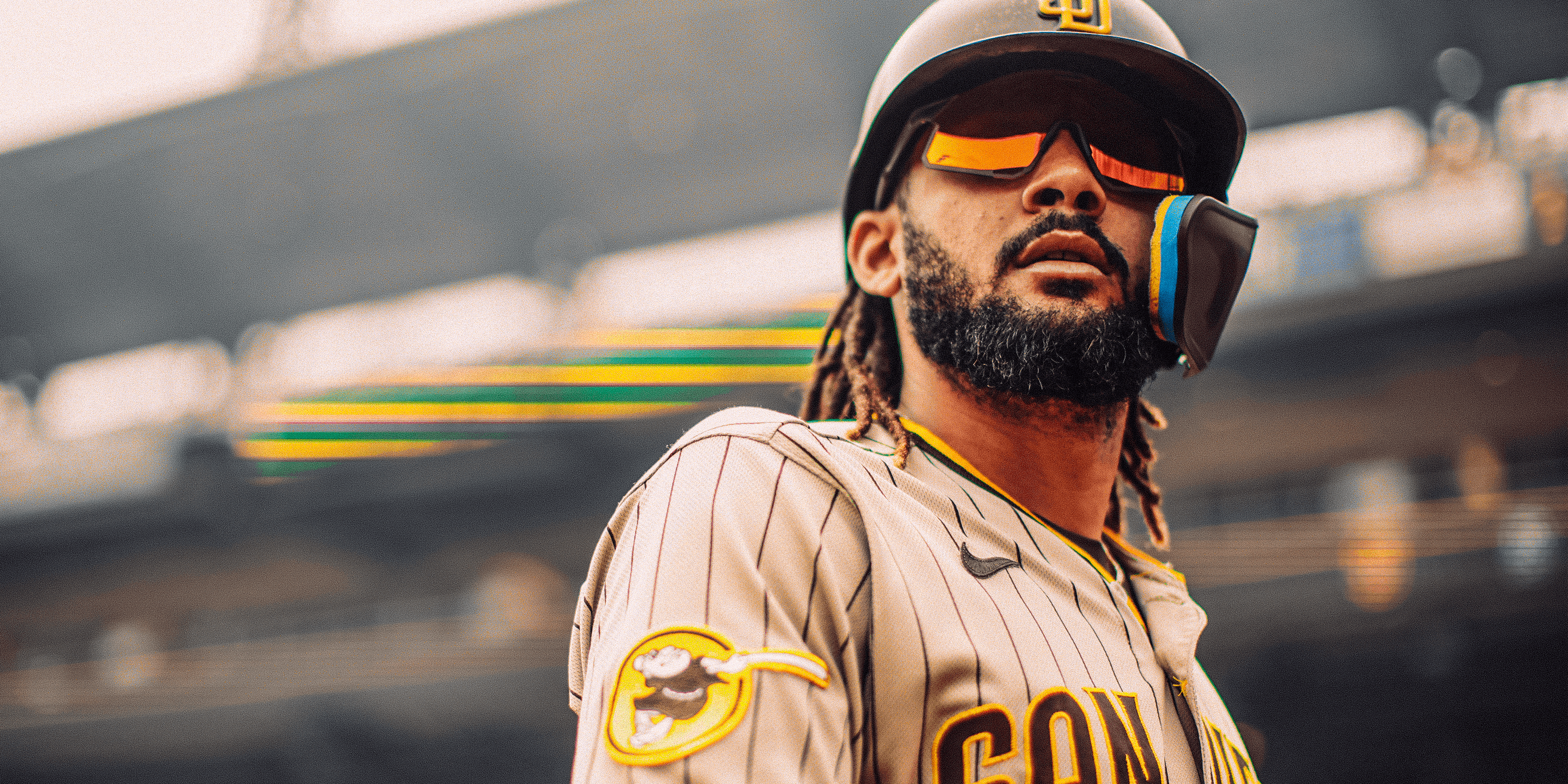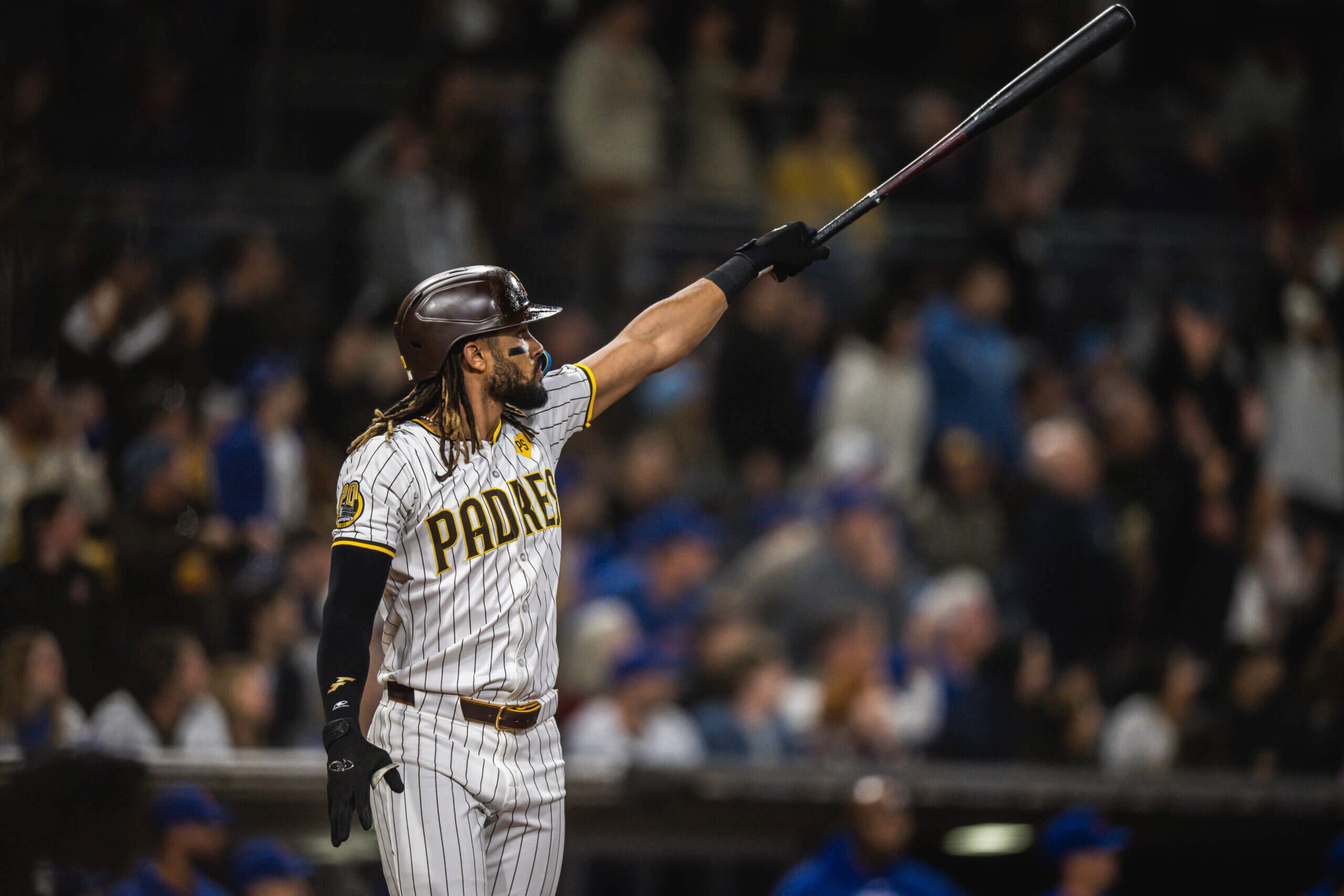
On May 20 in Atlanta, in the evening game of a doubleheader, Fernando Tatis, Jr. sped 84 feet across the outfield grass in Atlanta and crashed into the Truist Park fence to take away a hit from good friend Ronald Acuña, Jr. The impact knocked him to the ground, leaving significant scrapes.
“That’s the love for the game more than anything else,” Tatis told reporters about the catch afterward. “I knew it was going to hurt.”
Tatis, 25, has always played the game loud, uninhibited. Borderline reckless. He’s known for his leaping and diving catches, for dancing in the outfield and skipping around the bases and stealing home. In 2021, Tatis became the youngest player ever to grace the cover of “MLB the Show.” His jersey sales were among the league’s top three. Young fans tried to emulate his swing and his swagger, copying his epic bat flips and salivating over his shoes.
Tatis’ ever-changing cleats this season are flashy and fun, but the fact that he is a star without a shoe sponsorship deal is also a reminder of what else he is known for now. Two years ago, just months after he signed a 14-year, $340 million contract extension that set a record for a player who hadn’t yet reached salary arbitration, the league found the steroid Clostebol in his system. Tatis, who was on rehab assignment during the failed drug test, was suspended 80 games. He initially claimed the failed drug test was because of a treatment for ringworm, but later apologized for his actions and took accountability.
Once viewed as the future face of baseball, Tatis was immediately dropped by Adidas. Gatorade and Dairy Queen ads featuring him were pulled, and he acquired a new, unflattering label: steroid user.
Tatis, who was also coming off multiple surgeries, won a Platinum Gold Glove last season, his first in the outfield. But he struggled at the plate, hitting .257/.322/.449 with a 112 OPS+. On the road, Tatis was booed. On the national scale, baseball found other young stars to promote in the 564 days Tatis spent between big-league games.
This season, Tatis, the son of former big leaguer Fernando Tatis, still isn’t hitting as he once did — .244/.328/.412 through Wednesday. But his enthusiasm for the game has returned, and he is feeling more like himself.
“I actually love being under the radar,” Tatis, Jr. said in front of his locker this spring. Then, realizing how surprising that sounds, he dips his head back and cackles. “But also, we can’t deny ourselves.”

Tatis Jr. (homering against the Cubs in April) plays with flair, but off the field, he speaks so softly that teammates often strain to hear him. (Matt Thomas / San Diego Padres via Getty Images)
On the field, Tatis is responsible for some of the game’s most emphatic bat flips, often accompanied by yelling, jumping, or pounding his chest. Off of it, you have to strain to hear him. Behind the animated plays, Tatis is soft-spoken — “sweet,” as first-year Padres manager Mike Shildt puts it.
“I’ve always been quieter than my siblings,” said Tatis who is from San Pedro de Macorís, Dominican Republic. “I like to listen and to laugh.”
Tatis’ first steps in the big leagues were as a young child, following his dad in the clubhouse in Montreal, toting a tiny bat and taking swings on the field. In New York with the Mets, Sr. would take Jr. to the batting cages and encourage him to talk to the other big leaguers, players like Jose Reyes, Carlos Delgado and Angel Pagan. Tatis Sr. finished his career playing a few seasons in winter ball, and by then, Tatis Jr., already showing signs of being a star, was old enough to pay close attention and hone his skills.
In 2015, at age 16, he signed with the White Sox. They later traded him to the Padres, and by 2019, Manny Machado and then-Padres veteran Eric Hosmer were lobbying general manager A.J. Preller to bring Tatis up from the minors, saying that if the Padres were serious about winning, Tatis needed to be on the team. Preller listened, and Tatis’s career launched in a hurry.
Tatis finished third in NL Rookie of the Year voting that year despite appearing in only 84 games after a season-ending back injury. The following season, he finished fourth in the NL MVP race and was third in 2022. He was a two-time Silver Slugger, an All-Star in 2021, on the cover of “MLB The Show,” and he had his own colorway of Adidas’ Ultra Boost running shoe.
“It was a lot,” Tatis said, looking back at his first few years in the league. “It was a lot more than baseball. I don’t want to say I got misguided, but sometimes I got a little bit distracted.”
Then it all came crashing down. When the news became public that Tatis had tested positive for a performance-enhancing drug, he was at Double-A San Antonio on rehab assignment for a broken wrist from a motorcycle accident suffered in the Dominican during the offseason. The injury occurred during baseball’s lockout, when teams were prohibited from talking to players. Tatis showed up to spring training with the wrist still sore, and a subsequent MRI confirmed the fracture. He was on the cusp of returning when the suspension was levied.
Reaction to the suspension was swift and visceral. Tatis’ bobblehead night was canceled, his presence almost immediately scrubbed from team videos on the JumboTron. A giant mural of Tatis on Petco Park’s exterior was taken down. The guy baseball couldn’t get enough of was nowhere to be found.
“It’s not an easy situation, reputationally. People are going to make judgments,” Preller said. “He’s had to deal with that in the last couple years.”
When Tatis reported to spring training last year, he was still suspended, but was able to train with the team. He went to work with Padres outfield coach David Macias, who helped Tatis make the transition from shortstop to right field, a move precipitated by the hope that having less action and fewer collisions would keep Tatis, who has had multiple shoulder dislocations and several other injuries in his short career, healthier.
When he returned on April 20, 2023, Tatis — now in right field — had a front-row seat to fans’ hostility. Teammate Nelson Cruz, who was suspended 50 games in 2013 for his involvement in the Biogenesis scandal, became a voice of support, as did Machado. Padres pitcher Joe Musgrove, one of the handful of veterans Tatis first addressed his suspension with, said teammates were quick to move on. But, he told Tatis, eventually he needed to forgive himself.
“You can’t let it linger over your head, ‘I’m known as this cheater and this guy that took steroids and I have to act a certain way,’” Musgrove said. “It’s over. Now move on so you can be the player that you were before the steroid use. He was unbelievable before any of that happened. I continue to believe that he’s going to be a great player after.”
In 141 games in 2023, Tatis was a great defender — second among outfielders in Defensive Runs Saved (+27) and Ultimate Zone Rating (+12.3) — but he was a more pedestrian hitter.
This past offseason, Tatis returned to the Dominican Republic, and for the first time since he became a big leaguer he played winter ball, returning to his former team, Estrellas Orientales in Lidom. His coach? His father. Though he only played in a few winter ball games, Tatis put on an offensive show reminiscent of his best days.
“I needed that. I needed to play again,” said Tatis.
Said Machado, “It’s given him a chip on his shoulder heading into (this season), which I don’t think is a bad thing.”
Tatis entered spring training more vocal with teammates and in meetings, more confident, free of the uncertainty of how his presence would be perceived.
“I told him, ‘we’re going to win with you being more outspoken,’” Machado said. “’We need you, people look up to you. If you use your voice, you’re going to lead us in the right direction.’ And he’s been doing it ever since the offseason. He’s definitely matured in a big way.”
Asked what he’s learned the past two years, Tatis said, “things are never as bad as they seem.”
The Padres are asking Tatis to cover more ground in his second season as an outfielder, a way to better utilize his athleticism and also help rookie center fielder Jackson Merrill. In the early going, Tatis has experimented with playing closer to centerfield and deeper.
“He’s going to be able to change the game, robbing home runs and making really athletic plays where he’s leaping over the wall or jumping off it acrobatically,” Macias said. “There’s just not a lot of players like him in the game.”
Tatis’ offense, he and his teammates believe, will eventually return to its peak.
“The field is like his playground,” said Macias, who was impressed that Tatis took live reps in batting practice before every game last year, an unusual habit in the big leagues. “He’s always trying to create something and he’s never content. He wants to master everything, and because of that you are going to keep seeing a better Tati.”
If 2023 was the Redemption Tour, 2024 feels like it can be about baseball again for Tatis. Even after his suspension, Tatis is still one of the more marketable players in baseball. He’s charismatic, Latino in a sport where nearly half of its players are born outside the U.S., speaks perfect English and plays with a showman’s flair. He has already added new partnerships this year, appearing in an Opening Day ad for Corona and securing a deal with Champs, with a handful of other potential companies being discussed.
For all the ups and downs Tatis’ career has seen, he’s still only 25.
“He’s how old?” Musgrove said.
Cronenworth, 30, laughed when Tatis’s age is mentioned, then said: “I feel like he should be closer to my age.”
Tatis says he does want to be the face of baseball again, or to at least be in that conversation, but only because that would mean he’s playing at an All-Star level. And along the way, he believes that fans will come to see that there’s more to him below the surface.
“There is still a lot that people don’t know about me,” he said this spring, before grabbing his glove and heading out to the field. “It will come out with time.”
(Top image: John Bradford / The Athletic; Photos: Rob Tringali / Getty Images)